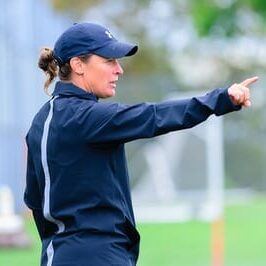
Tigers launch in-house female coach development program
Led by Cindy Tye, every female varsity Tigers coach will take part in the program
There aren’t many firsts for Emily Clarke because she’s already accomplished quite a bit.
She enjoyed a successful cross country and track career as a Dalhousie University Tigers student-athlete. She’s now in her fifth season as an assistant coach with each team. Last year, she was selected to participate in the inaugural U SPORTS Female Coach apprenticeship program.
Now with the launch of the Dalhousie Tigers Female Coach Development program led by women’s soccer coach and associate athletic director Cindy Tye, Clarke said this will be the first opportunity she’s had in her career to work with a female head coach.
“I’ve had a lot of great male coaches my whole life, including Rich [Lehman, head coach of Dal’s cross country and track and field teams]. But I’m excited to have a female head coach’s perspective on things,” she said.
Michele Tchiakoua is debuting as an assistant coach with the women’s basketball team this season after playing with the team for two seasons (plus a third missed due to injury). She’s ecstatic to be working with Tye and other coaches in the program, knowing the skillsets of different coaches she’ll possibly encounter and learn from.
“It’s amazing to have her as a mentor because she has a lot of experience, as both an athlete and coach,” Tchiakoua said. “This is important for me since I don’t have much experience yet coaching. It will be important to gain confidence as a coach, to work on my communication and leadership skills and create relationships with coaches and players.”
Building further female representation in coaching
The program, which is slated to run for at least a year, is split into two parts. One group consists of six coaches who will take part as apprentices and work on a near-monthly basis with Tye, often in each coach’s work environment.
Clarke and Tchiakoua are part of the apprentice group. Jodi Langley, who coaches with Clarke in track and field, and Marika Williams, who works with Tchiakoua on the women’s basketball staff, are also apprentices. They are joined by Savannah Newton of the women’s hockey team and Tessa Bulmer of women’s volleyball.
Over a dozen more coaches will take part in a monthly peer development group with a focus on training certification and developmental opportunities. From Dal’s seven varsity sports, every female assistant coach will take part in the program in some form.
“When applying for [program funding], one of the reasons was because female coaches are underrepresented at almost every level, especially at the university level,” Tye said. “In our environment, we felt like we could do something. We chose female coach development, being a group that needs that. They’re underrepresented in our department.”
Accessibility to one another in Dal-based program
One hallmark of the program is each coach’s accessibility to one another. Programs that Tye has participated in before, like the Nova Scotia Black and Indigenous Coach Mentorship Program, are often spread out over larger areas (like the province or country) and limit time mentors and apprentices share working together. COVID-19 only further restricted that interaction.
Now, with nearly everyone back on campus, Tye said the ability for participants to meet up, whether formally or informally, will go a long way.
“Once a month I’ll be able to go to [each apprentice’s environment], but probably more often because they’re so accessible,” she said. “That’s a cool part about the program is that everybody is, obviously, at Dal. That way, I can access them easily. In the groups, participants can access each other easier too.”
Tchiakoua said the fact the program is right at Dal will help her towards building her coaching skills. She also looks forward to serving as a potential role model for women in the program.
“It comes back to my goal to build communication and leadership skills, and how to provide players with a positive experience,” she said. “If you can give a positive experience, you have happy players who look forward to coming back to the gym every day because they like being there.
“It means a lot to give back to the community that welcomed me at Dal. I want to be able to be relatable to my players and people who watch me.”
Furthering representation of female coaches
Tchiakoua added it’s fantastic to see how the Tigers have taken initiative to increase support for their female coaches.
“Representation matters,” she said. “It’s important to have female coaches and assistant coaches, especially for women’s teams.”
Being in this position means a lot to Clarke too.
“It’s nice to be that voice and bring that perspective into coaching,” she said. “I hope I’m able to bring a little more of a balance to the coaching staff and provide different perspectives and approaches. Hopefully this program inspires other women to go into coaching. I hope I can inspire more people.”
This resource for female coaches will reflect positively on the program for years to come, Tye said.
“When you put time into developing your coaches, better coaches are better athletes,” she said. “The coaches get a better understanding of what they do and how they communicate. They dig in to make themselves better and when they get better, then they’re better for the student-athletes. It makes everyone stronger.”
Not many school-based programs addressing this area of coaching exist, in either the Atlantic University Sport (AUS) or U SPORTS. The Dalhousie Gazette asked Clarke and Tchiakoua whether the Tigers initiative will lead to other athletic programs doing similar things.
“Yeah, I hope so. I hope it inspires other schools to follow suit,” Clarke said.
Tchiakoua said she was sure of it.
“100 per cent. I think, 100 per cent, other schools do the same.”






